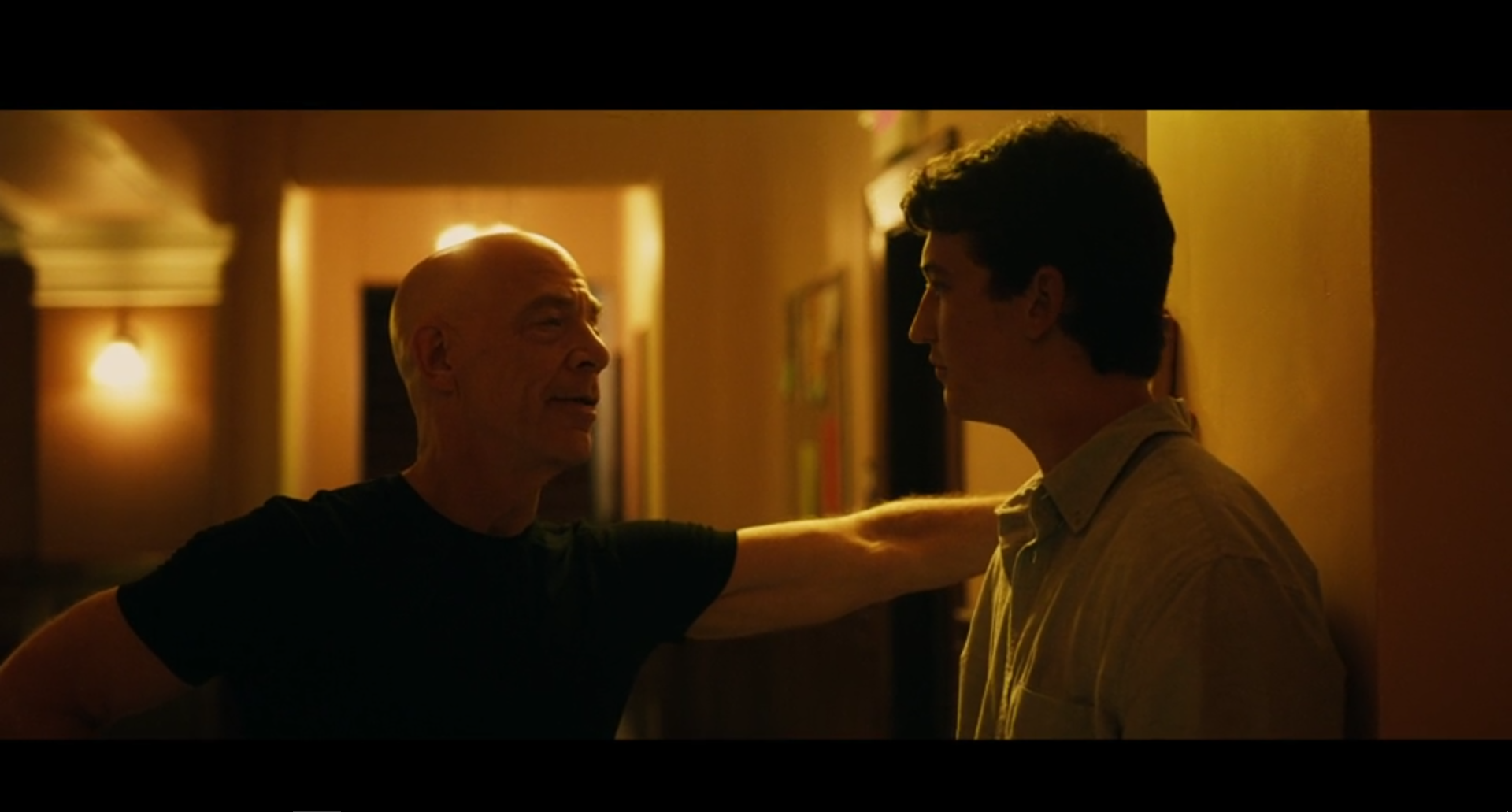Three years before he won the Best Director Oscar for La La Land Damien Chazelle’s low-budget film Whiplash understandably was criticized by some reviewers for its portrayal of jazz music and artistic genius. After all, in the fictional New York Shaffer Conservatory the abuses hurled back and forth between bandleader Terence Fletcher (J. K. Simmons) and drummer Andrew Neiman (Miles Teller) are painful to watch and even more difficult to accept as the price of musical greatness. Nonetheless, at the end of the film when Neiman finishes his monster drum solo and receives Fletcher’s approving gaze, viewers know that such greatness has been achieved.
However, Whiplash is less a portrait of greatness than of male heroism in extremis. Authors Robert Moore and Douglas Gillette write that young or immature males need heroic energy to leave the comfort of childhood and face the difficult life tasks ahead of them. In successfully channeling this energy, they gain a sense of their own strength, independence, and competence. They gain a sense of themselves as empowered men.
The authors also note that it is possible to become possessed by heroic energies. This possession takes two forms, the first of which they call the Grandstander Bully. A male caught in this energy focuses on impressing himself and others with his own importance and abilities. When these aspects of his personality inevitably are questioned, he reacts in a controlling, threatening, and hostile manner. Moore and Gillette write that he “will assault those who question what they ‘smell’ as his inflation with vicious verbal and often physical abuse.”
Both Fletcher and Neiman grandstand and bully in Whiplash. With his black attire accentuating his muscular physique, Fletcher repeatedly stands before and berates his musicians. He warns them not to “sabotage my band” or “tarnish my reputation.” Similarly, at a family dinner Neiman boasts that his accomplishments outshine those of his cousins. He also cruelly breaks up with his girlfriend (Melissa Benoist), telling her that she will keep him from becoming “one of the greats.”
The names Chazelle gives his two leads also reveal his central theme of male heroism in its darker aspects. The name Terence Fletcher means a tender, gracious or good maker and seller of arrows. In the film, he is warm and charming with a person one moment; seconds later, he wounds that individual with the wicked barb of personalized criticism. Likewise, the name Andrew Neiman means a manly or masculine newcomer, i.e., the new man in town. Fletcher calls him a “squeaker.”
According to Moore and Gillette, opposite the Grandstander Bully as the second form of heroic possession is the Coward. Paralyzed by fear, such a figure cannot stand up for himself when confronted. He allows himself to be bullied emotionally, intellectually, and physically. As weak as the bully is strong, he requires our protection.
This second figure also appears throughout Chazelle’s film. When Fletcher enters the rehearsal room his musicians stand with heads bowed or cowed. In one rehearsal a frightened trombone player cannot respond to Fletcher’s accusatory question as to whether he, the trombonist, is playing out of tune. Fletcher throws him out of the band. Finally, a former band member kills himself after suffering anxiety and depression that started while playing under Fletcher.
Author Tim Field coined the term serial bully to refer to a person who alternates between charismatic and abusive behavior often with multiple people over time. When reproached for bullying, the serial bully engages in a deliberate, learned strategy of denial, retaliation, and feigning victimhood. He denies allegations of abuse by minimizing them, avoiding the allegations altogether, or by intentionally creating a distraction or diversion. He often retaliates against his accuser with counter-attacks characterized by lying, deception, duplicity, hypocrisy and blame. Also, he avoids responsibility for his actions by feigning victimhood, claiming that he, the bully, is the one bullied. He, not the victim, is the injured party.
Fletcher exhibits most if not all of these qualities in Whiplash. He denies the toll taken on the human soul by his verbal and physical abuse with insinuations that this toll is the price of manhood and greatness. He lies throughout the film and blames Neiman for getting him fired from his job at Shaffer. In so doing he exhibits his own “victimhood.”
To many people the changeable events of these first weeks of President Trump’s administration may feel like whiplash, one definition of which is “to affect adversely as by a sudden change.” The extent to which such events have lasting negative or traumatic effects on individuals and the collective remains to be seen. Nevertheless, as people listen to heroic promises of bigly or big league changes and statements like “Make America Great Again” and “I alone can fix it” perhaps Field’s recommendations for protecting oneself from a bully should be considered. He notes that the primary tasks for the victim are to make the bullying stop or to get out of the situation.
Prior to the end of Whiplash Neiman appears to have accomplished both of these tasks. However, in the final scene he agrees to play in Fletcher’s new band. In a concert at Carnegie Hall, he goes head-to-head with Fletcher and again becomes possessed by the bully. In embracing this spirit, Neiman sacrifices intimacy with and relatedness to others and the “other.” He may achieve greatness but he loses those human qualities jazz and psychology call soul.
For more on workplace bullying and the Tim Field Foundation see www.bullyonline.org.



Right on, Chris.
Brilliant expose of the movie; it was good that you followed up with a comparison to the predator-in-chief.
7